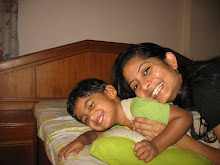Review of The toss of a lemon by Padma Viswanathan
This review appeared in The Sunday express in more or less the same fashion.
One reads the title and sighs, lemons, mangoes, poppies! Another Indian novel serving varied flora. And that too across 600 odd pages. Well, the suspicions turn out to be right with 'The toss of a lemon'. In the sense that it's about a family tree. But that's where the similarity ends. That's also where other similarities begin. Because anyone but anyone has a family tree. And if that anyone happens to be a tam-brahm, the book could very well be about her own family tree with all the usual suspects and then some.
At the head of the tree is Sivakami the teenage widow in pre-independence India, who goes through the next 60 odd years covered in pearly whites and hidden in dark shadows. Then there's her daughter Thangam, the woman who spends all of her mature life making children; Sivakami's son Vairum, the generous-to-a-fault business tycoon who's unrelentingly cruel to his mother; his wife Vani, the childless, musical genius with duly appointed eccentricities; Thangam's husband Goli, the handsome rake who contributes little to the story but tremendously to the growth of the family tree; and of course the gay servant Muchami, who also serves as an alter ego to Sivakami. Add to this melee, a friendly neighour or two, a devadasi, and a dozen or two fruits of love who make their appearances randomly.
Random is what you might think about the book too, with its no plot approach. But that in no way denies its appeal to keep the pages turning. All the way to the 619th page. Which, for fear of gushing, is an enormous feat for a first novel. Especially for Padma Viswanathan, who despite her name and brahmin origins, is a Canadian. The depth of research is commendable and the novel seems to have consumed 10 good years of her life. I, repeat, good years. In another time, it could've spawned a large family. Her own, actually, as the novel is part biography part fiction. And for that reason one is tempted to compare it with 'The God of small things'.
Interestingly, the novel is written in the present tense, except for the epilogue. It helps the reader literally walk with the characters in every stage. One wishes that the characters were etched out a little deeper. But then you could reason that in a self-abasing society, the individuals do not summon much space. There are also moments in the book that would've justified more evocation. Vairum's ousting of his aged, helpless mother from his house and her persistent longing for him for example, are goldmines that have been passed over with barely a few handfuls of earth to show for it.
Although Rushdie-like, the mix of the fantastical with the real does not gel in this novel. For instance, the seasonal shedding of gold dust by Thangam, and the waxing and waning of Vani's moods along with the lunar cycle, for no apparent reason. The chronicling, however, is precise with only the occasional burst of poetics drawing attention to it. Like an elegant silk sari with sparse gold work on it. Making the novel richer but not vulgarly so.
The descriptiveness in the novel is also limited though treated well, with some interesting allegories woven in. The description of a tamil brahmin wedding meal almost make you smell the sambar, for instance. Some images recur with reason and are duly evocative. Don't be surprised if Jagadhodharana plays in your head like a stuck record for the duration of the book, which by no means is a short time.
However, the most remarkable thing about the novel, is that you find yourself constantly replaying one scene or the other, musing about one character or the other, in the way you would think about your son playing in the park, or about the neighbour who never returns your books. Sivakami and her family might just end up traveling with you in your car, interrupt you during a phone conversation, and might even sit at the table to eat with you. Which, in my opinion, should give the Adyar Alamaram a run for its money.


0 Comments:
Post a Comment
<< Home